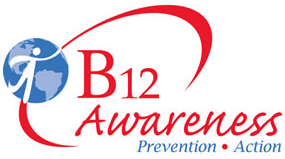About B12
What is Vitamin B12 ?
Vitamin B12 (cobalamin) is one of the 13 vitamins our body needs for health and life. It is essential for the production of red blood cells and aids in the maintenance of a healthy nervous system. B12 deficiency damages the brain, spinal cord, peripheral nerves, and nerves of the eye. It is a crucial element in the construction of DNA. A B12 deficiency can result in symptoms ranging from severe anemia requiring blood transfusions, to serious and permanent nerve damage. B12 is found naturally in animal foods including meat, fish, shellfish, poultry, dairy products, and eggs. Vitamin B12 must follow a complex pathway of several steps for proper absorption. A roadblock in any part of this pathway can cause malabsorption and subsequent deficiency.
The History of Vitamin B12
In 1934, Whipple, Murphy, and Minot shared the Nobel Prize in Physiology or Medicine for their life saving discovery found in liver. The disorder was referred to as “pernicious anemia” because before this discovery, death was inevitable. In 1948, the substance in liver was isolated and named cobalamin (vitamin B12).
The Incidence of B12 Deficiency
B12 deficiency is common and reported to affect 25% of the U.S. population. It strikes up to 15% (5.9 million) older adults > age 64. The CDC reports, one out of every 31 Americans > age 50 are B12 deficient. This report underestimates the incidence by using a cut-off range far too low. The incidence in infants and children is unknown, which is problematic.
Who to Test and Who is at Risk?
- Neurologic or motor symptoms
- Mental status changes
- Dementia or Alzheimer’s disease
- Psychiatric disorders
- Gastrointestinal disorders
- Gastrointestinal surgeries
- Gastric bypass
- Anemia
- Elevated MCV
- Age 60 and over
- Vegans
- Vegetarians, macrobiotic diets
- Autoimmune disorders
- Developmental delay
- Autism spectrum
- Breast fed infants of mothers at risk
- Eating disorders
- Family history of pernicious anemia
- Proton pump inhibitor use
- Metformin use
- Occlusive vascular disorders (MI, CVA, DVT, PE)
What are the Causes of B12 Deficiency?
- Decreased stomach acid
- Atrophic gastritis
- Autoimmune pernicious anemia
- Helicobacter pylori
- Gastrectomy, intestinal resection
- Gastric bypass surgery
- Malabsorption syndromes
- Crohn’s disease
- Celiac disease (gluten enteropathy)
- Chronic pancreatitis
- Bacterial overgrowth (small bowel)
- Fish tapeworm
- Alcoholism
- Malnutrition—Eating disorders
- Vegetarianism
- Advanced liver disease
- Transcobalamin II deficiency
- Inborn errors of B12 metabolism
- Certain drugs
- Nitrous oxide
Neurologic Signs and Symptoms
- Numbness—tingling
- Weakness of legs, arms, trunk
- Impaired vibration—position sense
- Abnormal reflexes
- Unsteady or abnormal gait
- Balance problems
- Difficulty ambulating
- Dizziness
- Tremor
- Restless legs
- Visual disturbances
- Forgetfulness, memory loss
- Dementia
- Impotence
- Urinary or fecal incontinence
Psychiatric Symptoms
- Depression
- Irritability
- Paranoia
- Mania
- Hallucinations
- Psychosis
- Violent behavior
- Personality changes
Hematologic Signs and Symptoms
- Anemia
- Macrocytosis (enlarged red-blood cells)
- Generalized weakness
- Fatigue
- Shortness of breath
- Pallor
Signs & Symptoms in Infants and Children
- Developmental delay or regression
- Apathy—Irritability
- Hypotonia
- Weakness
- Tremor
- Involuntary movements
- Seizures
- Ataxia
- Anorexia
- Failure to thrive
- Poor weight gain
- Poor head growth
- Poor socialization
- Poor motor skills
- Language delay
- Lower IQ—Mental retardation
- Anemia
- Macrocytosis
Why is B12 Deficiency an Epidemic?
- Knowledge deficit amongst physicians and other health care providers
- Poor or absent screening in symptomatic and at-risk patients
- Current range for “normal” serum B12 test extends far too low
- Lack of use of other sensitive tests to aid in diagnosis (methylmalonic acid)
- Clinicians wait for enlarged red blood cells or macrocytic anemia to be present
- Elderly are frequently misdiagnosed due to increased incidence of preexisting diseases and comorbid conditions
- B12 screening not included in older adults who fall or are at risk for falling
Disorders With Possible Underlying B12 Deficiency
- Dementia—Alzheimer’s disease
- Multiple sclerosis
- Depression
- Post-partum depression/psychosis
- Bipolar disorder
- Neuropathy (diabetic, CIDP)
- Vertigo
- Anemia
- Congestive heart failure
- Autism
- AIDS dementia complex
- Restless leg syndrome
- Radiculopathy, chronic pain disorder
- Chronic fatigue syndrome
- Fibromyalgia
- Chronic renal failure (hemodialysis patients)
- Essential tremor—Parkinson’s disease
- Erectile dysfunction
- Infertility
Diagnostic Tests for B12 Deficiency
- Serum B12
- Methylmalonic acid
- Homocysteine
- Holotranscobalamin II (Holo-TC)
